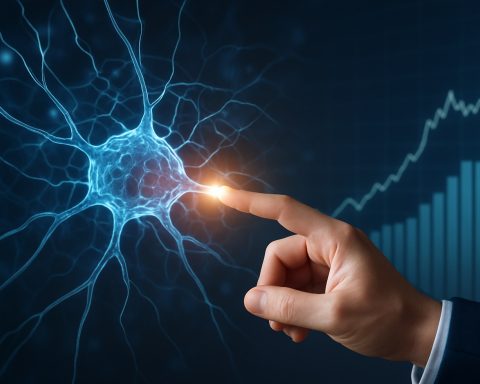- Global EV sales surged to 1.2 million units in February 2025, marking a 50% year-over-year increase.
- China leads the EV industry, controlling 95% of battery-grade graphite and 76% of the global EV market due to strategic supply chain investments.
- Western markets, including the US and Europe, face risks from supply chain disruptions and potential tariffs.
- Biographite emerges as a sustainable alternative for battery-grade graphite, offering cost benefits and reduced carbon footprints.
- Major automakers like Ford, General Motors, and Volkswagen face financial challenges from expensive battery inputs and supply chains.
- Local sourcing of materials like biographite can enhance supply chain resilience and promote genuinely carbon-zero vehicles.
- Geopolitical concerns highlight the need for strategic investments in domestic mineral production and innovative policies.
The electric vehicle (EV) industry, charged by a booming surge in global sales, is on a thrilling trajectory. February 2025 saw EV sales soar to 1.2 million units, marking a 50% leap compared to the same month last year. Yet, beneath this electrifying momentum lies a less visible but fiercely important contest—the race for the minerals critical to powering this transition.
For now, China is indisputably at the forefront. The nation commands an overwhelming 95% of the world’s battery-grade graphite market while securing 76% of the global EV marketplace. Such dominance stems from a strategic foresight, where China swiftly recognized the pivotal role of EV supply chains and invested heavily. The late 2023 move to enforce stricter export permits on graphite products only underscores the strategic path China has paved.
Conversely, Western markets, notably the United States and Europe, have lagged. This delay places their industries at risk, leaving them susceptible to geopolitical shifts, supply chain disruptions, and proposed tariffs—such as Donald Trump’s suggested 25% tariff on vehicle imports—that could exacerbate trade tensions and volatility.
However, the longer-term solution must transcend tariffs. Innovation beckons, offering a promising trajectory toward resilient and sustainable EV production. Enter biographite: a pioneering alternative crafted from renewable forestry by-products through a carbon-sequestering, low-temperature process. This marvel provides not just a domestic, cost-effective source for battery-grade graphite but also slashes the carbon footprint and navigates around the cost quagmire of traditional mining and transport.
Major automakers like Ford, which projects a $5 billion loss in its EV division by 2025, face mounting financial strain from expensive battery inputs and vast supply chains. General Motors and Volkswagen echo similar challenges, underlining the financial tightrope of scaling production while managing costs.
By pivoting to domestic solutions like biographite, companies can not only enjoy economic benefits but also environmental rewards, unlocking the potential for genuinely carbon-zero vehicles. The path forward steers toward embracing locally sourced materials, thereby strengthening the supply chain control while bolstering resilience and cost efficiency.
Looking beyond mere economics, the geopolitical stakes are profound. Dependence on a single nation for critical minerals exposes vulnerabilities that temporary tariffs cannot resolve. Instead, strategic investments in domestic production and innovative mineral policies are imperative. Initiatives such as the Inflation Reduction Act and the EU’s efforts to streamline permitting are steps in the right direction, promoting local mineral sourcing and bolstering domestic mining capabilities.
Ultimately, the future heralds not just a shift in transportation but a revolution in how industries source their critical raw materials. Biographite exemplifies the kind of ingenuity needed for a sustainable, self-reliant future in EV production. As industries lean into innovation, they edge closer to breaking free from today’s concentrated supply chains, unveiling the pathway to a greener, more resilient tomorrow.
Unlocking Sustainable Supply Chains: Why Biographite is the Key to the Future of EV Manufacturing
The electric vehicle (EV) industry is witnessing unprecedented growth, highlighted by a staggering 50% increase in sales in February 2025. This surge, although impressive, masks a critical aspect of the industry—its significant dependence on specific minerals for battery production. Currently, China dominates this space, controlling 95% of the battery-grade graphite market and 76% of the global EV market. This dominance arises from strategic foresight and an aggressive investment in the EV supply chain infrastructure. However, with geopolitical tensions threatening the stability of these supply chains, the industry is pivoting towards alternatives like biographite to ensure resilience and sustainability.
Why Focus on Biographite?
Understanding Biographite:
Biographite is a sustainable alternative to traditional graphite, produced from renewable forestry by-products. Through a carbon-sequestering, low-temperature process, biographite emerges as a domestic and eco-friendly solution to the graphite supply dilemma.
Advantages Over Traditional Graphite:
– Environmental Benefits: Biographite reduces carbon emissions significantly compared to traditional mining.
– Economic Viability: Minimizes reliance on overseas imports, thus lowering transportation costs and mitigating geopolitical risks.
– Supply Chain Resilience: Enhances the security of the supply chain by utilizing locally sourced materials.
How Automakers are Adapting
Major automakers are feeling the financial strain of the EV revolution. Ford, for instance, is bracing for a projected $5 billion loss in its EV division by 2025 due to costly battery inputs and expansive supply chains. Companies like General Motors and Volkswagen face similar challenges. Biographite offers a pathway to reduce these costs fundamentally.
Real-World Use Case:
– Improving Margins: By integrating biographite, automakers can improve margins via cost-effective battery production and reduced import dependencies.
– Innovative Collaborations: Initiatives such as the Inflation Reduction Act in the U.S. aim to promote local mineral sourcing, encouraging companies to explore biographite solutions.
Market Forecasts & Trends
Growth in Domestic Production:
– U.S. and Europe Initiatives: Actions to streamline permitting and promote domestic mining capabilities are paving the way for biographite’s integration.
– China’s Export Policies: With stricter export controls on graphite, the need for alternative sourcing becomes more imperative for Western automakers.
Expansion of Biographite Applications:
– As the technology behind biographite evolves, its applications could extend beyond EVs to other sectors requiring sustainable battery solutions.
Controversies & Limitations
Challenges in Scaling Up:
– Although promising, the biographite production process is still in the early stages. Scaling up production to meet global demands poses a logistical and technological challenge.
Commercial Awareness and Acceptance:
– Ensuring industry awareness and acceptance of biographite as a viable alternative will be critical to its success.
Key Takeaways
– Explore Local Solutions: Automakers should explore local resources like biographite to enhance supply chain resilience and sustainability.
– Adapt to Market Changes: Keeping an eye on geopolitical developments and strategically investing in innovations are crucial for long-term success.
– Invest in Sustainability: Prioritizing eco-friendly solutions not only benefits the environment but also ensures economic stability and growth.
To read more about the EV industry’s future and sustainable energy alternatives, visit U.S. Energy Information Administration for comprehensive insights.
By understanding these dynamics and leveraging innovative alternatives like biographite, the EV industry can not only weather the storm of geopolitical tensions but emerge stronger and more sustainable than ever.









